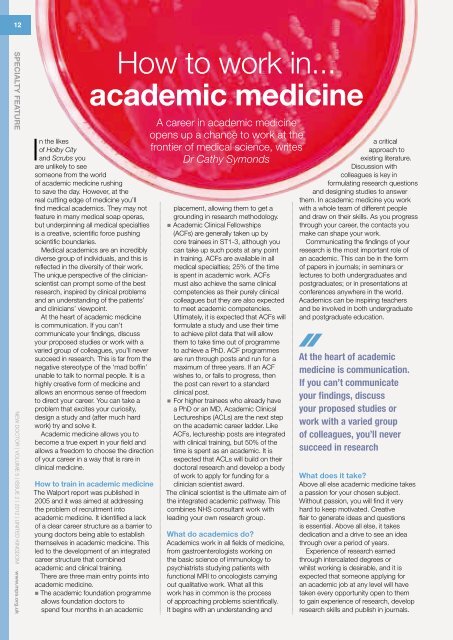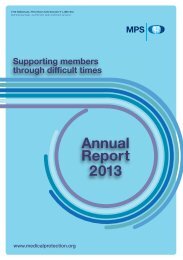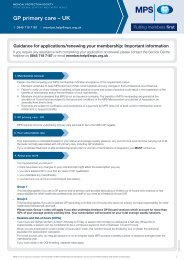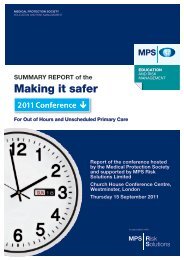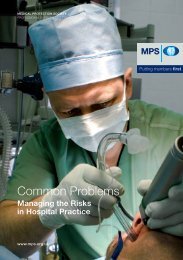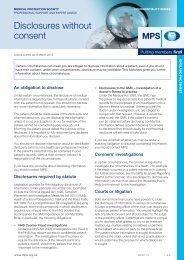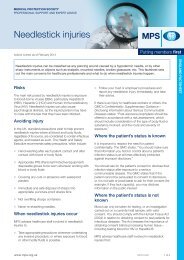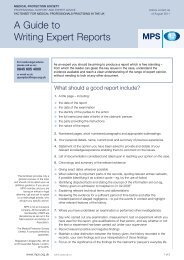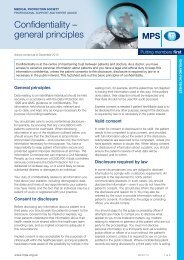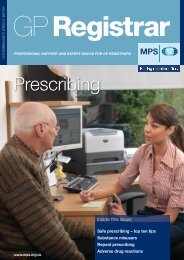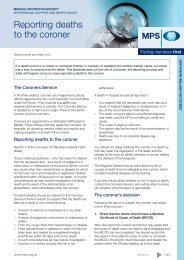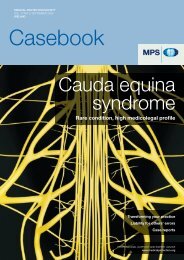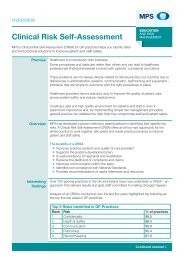New Doctor - Medical Protection Society
New Doctor - Medical Protection Society
New Doctor - Medical Protection Society
You also want an ePaper? Increase the reach of your titles
YUMPU automatically turns print PDFs into web optimized ePapers that Google loves.
12<br />
SPECIALTY FEATURE<br />
NEW DOCTOR | VOLUME 5 | ISSUE 2 | 2012 | UNITED KINGDOM www.mps.org.uk<br />
In the likes<br />
of Holby City<br />
and Scrubs you<br />
are unlikely to see<br />
someone from the world<br />
of academic medicine rushing<br />
to save the day. However, at the<br />
real cutting edge of medicine you’ll<br />
find medical academics. They may not<br />
feature in many medical soap operas,<br />
but underpinning all medical specialties<br />
is a creative, scientific force pushing<br />
scientific boundaries.<br />
<strong>Medical</strong> academics are an incredibly<br />
diverse group of individuals, and this is<br />
reflected in the diversity of their work.<br />
The unique perspective of the clinicianscientist<br />
can prompt some of the best<br />
research, inspired by clinical problems<br />
and an understanding of the patients’<br />
and clinicians’ viewpoint.<br />
At the heart of academic medicine<br />
is communication. If you can’t<br />
communicate your findings, discuss<br />
your proposed studies or work with a<br />
varied group of colleagues, you’ll never<br />
succeed in research. This is far from the<br />
negative stereotype of the ‘mad boffin’<br />
unable to talk to normal people. It is a<br />
highly creative form of medicine and<br />
allows an enormous sense of freedom<br />
to direct your career. You can take a<br />
problem that excites your curiosity,<br />
design a study and (after much hard<br />
work) try and solve it.<br />
Academic medicine allows you to<br />
become a true expert in your field and<br />
allows a freedom to choose the direction<br />
of your career in a way that is rare in<br />
clinical medicine.<br />
How to train in academic medicine<br />
The Walport report was published in<br />
2005 and it was aimed at addressing<br />
the problem of recruitment into<br />
academic medicine. It identified a lack<br />
of a clear career structure as a barrier to<br />
young doctors being able to establish<br />
themselves in academic medicine. This<br />
led to the development of an integrated<br />
career structure that combined<br />
academic and clinical training.<br />
There are three main entry points into<br />
academic medicine.<br />
How to work in...<br />
academic medicine<br />
■ ■The<br />
academic foundation programme<br />
allows foundation doctors to<br />
spend four months in an academic<br />
A career in academic medicine<br />
opens up a chance to work at the<br />
frontier of medical science, writes<br />
Dr Cathy Symonds<br />
placement, allowing them to get a<br />
grounding in research methodology.<br />
■ ■Academic<br />
Clinical Fellowships<br />
(ACFs) are generally taken up by<br />
core trainees in ST1-3, although you<br />
can take up such posts at any point<br />
in training. ACFs are available in all<br />
medical specialties; 25% of the time<br />
is spent in academic work. ACFs<br />
must also achieve the same clinical<br />
competencies as their purely clinical<br />
colleagues but they are also expected<br />
to meet academic competencies.<br />
Ultimately, it is expected that ACFs will<br />
formulate a study and use their time<br />
to achieve pilot data that will allow<br />
them to take time out of programme<br />
to achieve a PhD. ACF programmes<br />
are run through posts and run for a<br />
maximum of three years. If an ACF<br />
wishes to, or fails to progress, then<br />
the post can revert to a standard<br />
clinical post.<br />
■ ■ For higher trainees who already have<br />
a PhD or an MD, Academic Clinical<br />
Lectureships (ACLs) are the next step<br />
on the academic career ladder. Like<br />
ACFs, lectureship posts are integrated<br />
with clinical training, but 50% of the<br />
time is spent as an academic. It is<br />
expected that ACLs will build on their<br />
doctoral research and develop a body<br />
of work to apply for funding for a<br />
clinician scientist award.<br />
The clinical scientist is the ultimate aim of<br />
the integrated academic pathway. This<br />
combines NHS consultant work with<br />
leading your own research group.<br />
What do academics do?<br />
Academics work in all fields of medicine,<br />
from gastroenterologists working on<br />
the basic science of immunology to<br />
psychiatrists studying patients with<br />
functional MRI to oncologists carrying<br />
out qualitative work. What all this<br />
work has in common is the process<br />
of approaching problems scientifically.<br />
It begins with an understanding and<br />
a critical<br />
approach to<br />
existing literature.<br />
Discussion with<br />
colleagues is key in<br />
formulating research questions<br />
and designing studies to answer<br />
them. In academic medicine you work<br />
with a whole team of different people<br />
and draw on their skills. As you progress<br />
through your career, the contacts you<br />
make can shape your work.<br />
Communicating the findings of your<br />
research is the most important role of<br />
an academic. This can be in the form<br />
of papers in journals; in seminars or<br />
lectures to both undergraduates and<br />
postgraduates; or in presentations at<br />
conferences anywhere in the world.<br />
Academics can be inspiring teachers<br />
and be involved in both undergraduate<br />
and postgraduate education.<br />
At the heart of academic<br />
medicine is communication.<br />
If you can’t communicate<br />
your findings, discuss<br />
your proposed studies or<br />
work with a varied group<br />
of colleagues, you’ll never<br />
succeed in research<br />
What does it take?<br />
Above all else academic medicine takes<br />
a passion for your chosen subject.<br />
Without passion, you will find it very<br />
hard to keep motivated. Creative<br />
flair to generate ideas and questions<br />
is essential. Above all else, it takes<br />
dedication and a drive to see an idea<br />
through over a period of years.<br />
Experience of research earned<br />
through intercalated degrees or<br />
whilst working is desirable, and it is<br />
expected that someone applying for<br />
an academic job at any level will have<br />
taken every opportunity open to them<br />
to gain experience of research, develop<br />
research skills and publish in journals.


